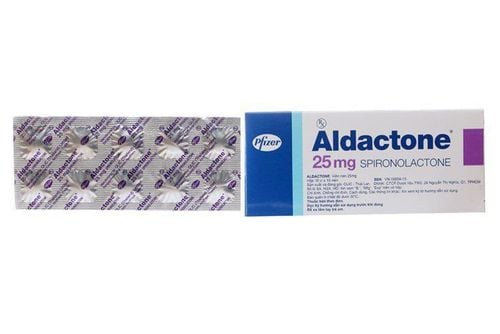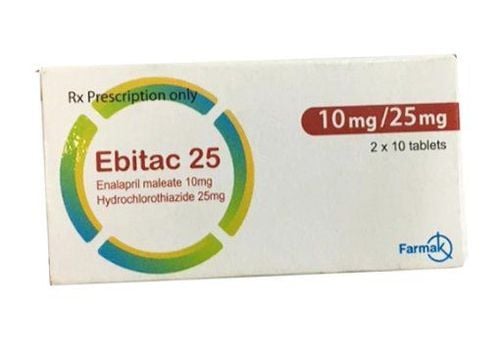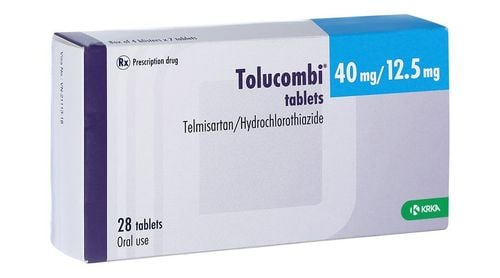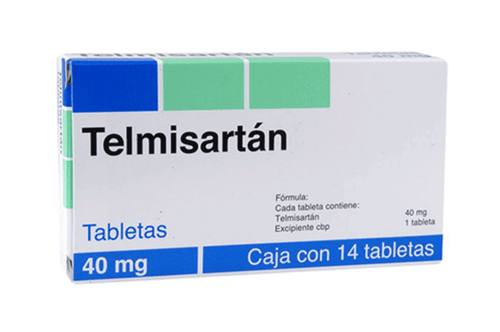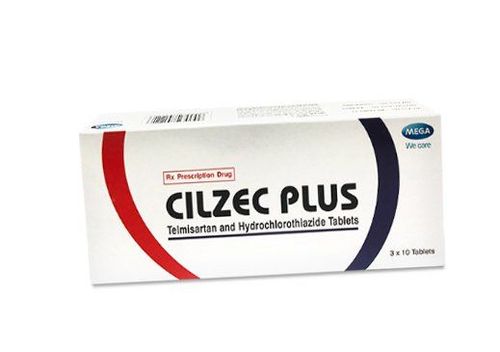This is an automatically translated article.
Hypertension is an extremely common disease today, according to which antihypertensive drugs are also very diverse, in which the most popular are angiotensin II receptor blockers and diuretics. A product that combines these two drugs is Safetelmi H 80/12.5 with the ingredients Telmisartan and Hydrochlorothiazide. So what should be noted when using Safetelmi H 80/12.5?
1. What is Safetelmi H 80/12.5?
Safetelmi H 80/12.5 is a product of MSN Laboratories Limited, the ingredients include two active ingredients, Telmisartan and Hydrochlorothiazide, with concentrations of 80 and 12.5mg, respectively. Safetelmi H 80/12.5 is mainly used in the treatment of essential hypertension.
2. Indications of Safetelmi H 80/12.5
Safetelmi H is indicated primarily for the treatment of essential hypertension in patients whose blood pressure is not completely controlled on telmisartan or hydrochlorothiazide alone.Safetelmi H 80/12.5 is a combination product of an angiotensin II receptor antagonist (Telmisartan) and a thiazide diuretic (Hydrochlorothiazide). This combination provides a synergistic effect that lowers blood pressure to a greater extent than either active ingredient alone. Safetelmi H 80/12.5 administered once daily provides an effective and gentle reduction in blood pressure within the therapeutic dose range.
3. Dosage of Safetelmi H 80/12.5
Safetelmi H 80/12.5 use orally, once a day with water, before or after meals.
Specific dosage of Safetelmi H 80/12.5 :
Adults: The dose of Telmisartan alone should be increased before switching to Safetelmi H; Safetelmi H 80/12.5 can be taken orally once daily in patients whose blood pressure is not completely controlled on telmisartan 40 mg or hydrochlorothiazide; Safetelmi H 80/12.5 can be taken orally once a day in patients whose blood pressure is controlled on Telmisartan 80mg or Safetelmi H 40/12.5mg; The optimal antihypertensive effect of Safetelmi H 80/12.5 is usually achieved after 4 - 8 weeks of treatment. In case of necessity, Safetelmi H can be combined with another antihypertensive drug; Patients with renal impairment: Due to the presence of Hydrochlorothiazide, Safetelmi H 80/12.5 should not be used in patients with severe renal impairment (creatinine clearance less than 30ml/min). There is little experience with this drug in patients with moderate to mild renal impairment. However, no side effects have been recorded on the kidneys, so there is no need to adjust the dose but periodically monitor renal function; Patients with hepatic impairment: Patients with mild to moderate hepatic impairment should take up to a maximum of Safetelmi H 40/12.5 once a day. Safetelmi H 80/12.5 is not contraindicated in patients with severe hepatic impairment due to thiazide diuretics and should be used with caution in patients with impaired liver function; Elderly: No dose adjustment of Safetelmi H 80/12.5 is required; Children and adolescents: Safety and efficacy have not been established. Use of Safetelmi H 80/12.5 overdose and management:
There is limited information available on overdose of Safetelmi H in humans, the most prominent manifestation of which is probably low blood pressure, tachycardia or tachycardia. slow; An overdose of Hydrochlorothiazide can cause a decrease in electrolytes (such as potassium and chlorine) and dehydration. Hypokalemia may cause vasoconstriction and/or serious arrhythmias when used concomitantly with digitalis glycosides or certain antiarrhythmic agents. What to do if you miss a dose of Safetelmi H 80/12.5 ?
If a dose of Safetelmi H 80/12.5 is missed, the patient should take it as soon as possible. However, if it is almost time for your next dose, skip the missed dose and take your next dose at the scheduled time.
4. Possible side effects of Safetelmi H 80/12.5
To date, no adverse reactions have been observed in clinical trials with Safetelmi H 80/12.5. However, the potential for adverse events during treatment with Safetelmi H 80/12.5 is based on experience with telmisartan or hydrochlorothiazide alone.
The most common side effect associated with Safetelmi H 80/12.5 dizziness. In addition, a few patients experienced the following abnormal symptoms:
Hypokalemia; Worried; Syncope, paresthesia; Overbalance; Tachycardia, arrhythmia; Hypotension or orthostatic hypotension; Shortness of breath; Diarrhea, dry mouth, flatulence; Back pain, muscle spasms, muscle pain; Erectile dysfunction . Some rare side effects of Safetelmi H 80/12.5 :
Bronchitis, pharyngitis, sinusitis; Fever or activation of systemic lupus erythematosus; Hyperuricemia or hyponatremia; Depression; Insomnia, sleep disorder; Visual disturbances, decreased vision; Abdominal pain, constipation, indigestion, vomiting, gastritis; Liver dysfunction; Edema, erythema, pruritus, rash, urticaria; Muscle pain, cramps, pain in the extremities; Increased creatinine, creatine phosphokinase and liver enzymes.
5. Contraindications of Safetelmi H 80/12.5
Safetelmi H 80/12.5 is contraindicated in the following cases:
Hypersensitivity to any of the ingredients in Safetelmi H 80/12.5; Hypersensitivity to active substances that are sulfonamide derivatives; Women who are pregnant or breastfeeding; Cholestatic disease, biliary obstruction; Severe liver failure; Severe renal impairment (creatinine clearance less than 30ml/min); Hypokalemia or hypercalcemia unresponsive to treatment.
6. Some precautions when using Safetelmi H 80/12.5
Use of Safetelmi H 80/12.5 during pregnancy:
Patients during pregnancy should not be initiated with angiotensin II receptor blockers; Women taking Safetelmi H 80/12.5 and planning to become pregnant should switch to another antihypertensive agent that has been shown to be safe during pregnancy, unless treatment with an angiotensin II receptor blocker is really necessary; When a patient is confirmed to be pregnant, treatment with angiotensin II receptor blockers (such as Safetelmi H 80/12.5) should be discontinued immediately and replacement therapy initiated if necessary. Use of Safetelmi H 80/12.5 in patients with liver failure:
Safetelmi H 80/12.5 is not indicated for people with cholestatic disorders, biliary obstruction or severe liver failure because Telmisartan is eliminated mainly through the bile; Safetelmi H 80/12.5 should be used with caution in patients with hepatic impairment or progressive liver disease, as even a small change in water and electrolyte balance can cause hepatic coma. The risk of severe hypotension and renal failure is increased if patients with bilateral renal artery stenosis or unilateral renal artery stenosis are treated with these drugs. drugs that affect the renin-angiotensin-aldosterone system such as Safetelmi H 80/12.5 .
Use Safetelmi H 80/12.5 in patients with renal failure and kidney transplantation:
Do not use Safetelmi H 80/12.5 in patients with severe renal impairment with creatinine clearance less than 30 ml/min; Experience with Safetelmi H 80/12.5 in patients with mild to moderate renal impairment is limited, so it is recommended that serum potassium, creatinine and uric acid levels be monitored. Use of Safetelmi H 80/12.5 in patients with intravascular volume depletion:
Symptomatic hypotension, particularly after the first dose of Safetelmi H 80/12.5, may occur in hypovolemic and/or hypovolemic patients. sodium loss due to causes such as overuse of diuretics, too strict salt abstention, diarrhea or vomiting. Therefore, the above conditions need to be overcome before using Safetelmi H 80/12.5 . Patients with primary aldosteronism usually do not respond to antihypertensive agents through inhibition of the renin-angiotensin system. Therefore, the use of Safetelmi H 80/12.5 is not recommended for this population.
Metabolic and endocrine effects of Safetelmi H 80/12.5 :
Thiazide diuretics may decrease glucose tolerance. Therefore, when using Safetelmi H 80/12.5 in diabetic patients, it may be necessary to adjust the dose of insulin or other oral hypoglycemic agents; Increased blood cholesterol and triglyceride levels have been shown to be associated with thiazide diuretic therapy. However, little or no such effect has been reported with the 12.5 mg dose of Hydrochlorothiazide in Safetelmi H. Electrolyte disturbances associated with Safetelmi H 80/12.5 :
Any patient receiving thiazide diuretics should have their blood electrolytes periodically checked at appropriate times; Thiazide diuretics, including hydrochlorothiazide in Safetelmi H 80/12.5, may cause fluid and electrolyte imbalances (including hypokalemia, hyponatremia, and hypochloremic alkalosis). Manifestations suggestive of electrolyte imbalance are dry mouth, thirst, muscle weakness, lethargy, drowsiness, muscle pain or cramps, hypotension, oliguria, tachycardia, and gastrointestinal disturbances; Although hypokalemia may occur with thiazide diuretics, the combination of telmisartan may reduce the magnitude of this effect; Conversely, the angiotensin II (AT) receptor antagonism mechanism of telmisartan in Safetelmi H may lead to hyperkalemia. Risk factors for hyperkalemia include renal and/or heart failure and diabetes. As with other antihypertensive agents, excessive hypotension, if present in a patient with ischemic heart disease, can lead to myocardial infarction or stroke.
Hypersensitivity reactions to Hydrochlorothiazide can occur in people with or without a history of allergies or bronchial asthma, but the risk is higher if the patient has such a history.
There are no data showing that telmisartan affects the ability to drive and use machines. However, when driving and operating machinery, it should be borne in mind that dizziness or drowsiness can sometimes occur with the use of blood pressure medications such as Safetelmi H 80/12.5.
Using Safetelmi H 80/12.5 during lactation:
Contraindications to using Safetelmi H 80/12.5 during lactation; In humans, it is not known whether Safetelmi H 80/12.5 is excreted in human milk. Animal studies have shown that telmisartan may be excreted in human milk. Similar to thiazides and may inhibit lactation.
7. Safetelmi H 80/12.5 drug interactions
Elevated serum lithium concentrations have been reported during the co-administration of Lithium with angiotensin-converting enzyme inhibitors and in some cases with angiotensin II receptor blockers such as telmisartan. In addition, the renal clearance of Lithium is reduced by thiazide diuretics, leading to an increased risk of Lithium toxicity when combined with Safetelmi H 80/12.5. This drug combination requires medical supervision and blood lithium levels should be monitored during use.
The potassium-depleting effect of Hydrochlorothiazide may be limited by Telmisartan's ability to retain potassium. However, this undesirable effect of Hydrochlorothiazide can be serious when drugs that cause loss and hypokalemia are used concurrently. Examples include potassium-sparing diuretics, laxatives, corticosteroids, amphotericin B, carbenoxolone, penicillin G, salicylic acid and derivatives. Therefore, when these drugs are used concurrently with Safetelmi H 80/12.5, it is necessary to monitor blood potassium levels regularly.
In contrast, when taking drugs that inhibit the renin-angiotensin system such as telmisartan, when combined with potassium-sparing diuretics, potassium supplements or other drugs that increase blood potassium can lead to an increase in blood potassium. serum potassium. Therefore, if the patient is co-administered with Safetelmi H 80/12.5, the serum potassium level should be monitored periodically.
Periodic monitoring of serum potassium is also recommended when Safetelmi H 80/12.5 is combined with medicinal products that may be affected by disturbances in the potassium balance, such as digitalis glycosides, antiarrhythmic agents and drugs. capable of causing torsades de pointes.
Concomitant use of Safetelmi H 80/12.5 with non-steroidal anti-inflammatory drugs (NSAIDs) including ASA doses for anti-inflammatory effects, COX-2 inhibitors and non-selective non-steroidal anti-inflammatory drugs may cause acute renal failure if the patient is dehydrated. Patients receiving concomitant non-steroidal anti-inflammatory drugs and Safetelmi H 80/12.5 should be adequately rehydrated and renal function monitored at the initiation of combination therapy.
There are no clinically significant interactions when telmisartan is co-administered with Digoxin, Warfarin, Hydrochlorothiazide, Glibenclamide, Ibuprofen, Paracetamol, Simvastatin and Amlodipine.
When used concurrently, the following drugs may interact with thiazide diuretics:
Alcohol, barbiturates or narcotics (narcotic) increase the risk of orthostatic hypotension; Antidiabetic drugs (oral drugs and insulin): Dosage adjustment is required when Thiazide diuretics are used concurrently; Metformin: Risk of acidosis when used concomitantly with Hydrochlorothiazide; Cholestyramine and Colestipol resins: Hydrochlorothiazide absorption may be reduced in the presence of ion exchange resins; Digitalis glycosides: Thiazide-induced hypokalemia and hypomagnesemia increases the risk of digitalis arrhythmias; Hypertensive amines (eg norepinephrine): Thiazides may decrease the response to hypertensive amines; Non-depolarizing muscle relaxants (eg, tubocurarine): The effects of this drug may be enhanced by Hydrochlorothiazide; Gout medications require dose adjustment because Hydrochlorothiazide may increase serum uric acid levels. Safetelmi H 80/12.5 has two active ingredients, Telmisartan and Hydrochlorothiazide, with concentrations of 80 and 12.5mg, respectively. Safetelmi H 80/12.5 is mainly used in the treatment of essential hypertension. To ensure the effectiveness of treatment and avoid unwanted side effects, patients need to strictly follow the instructions of the doctor, professional pharmacist.
Follow Vinmec International General Hospital website to get more health, nutrition and beauty information to protect the health of yourself and your loved ones in your family.
Please dial HOTLINE for more information or register for an appointment HERE. Download MyVinmec app to make appointments faster and to manage your bookings easily.




